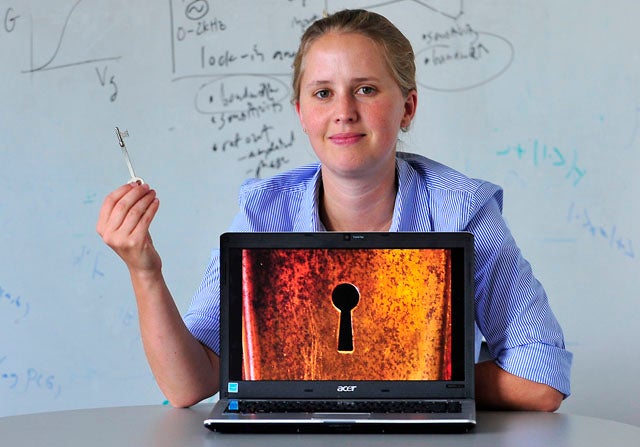Thursday, January 19, 2012
IQC Postdoctoral Fellow Anne Broadbent is part of an international research team whose latest achievement in secure quantum computing is published this week in the journal Science.

The result, published in the journal Science this week, represents a crucial step toward secure globalized quantum computing.
Quantum computers are expected to revolutionize information processing, since they are known to outperform their present-day “classical” counterparts at many tasks.
First-generation quantum computers will likely be housed in a few specialized facilities, and therefore computation will be done in the “cloud” — that is, central remote servers will be used to process and store data. Because multiple users will “outsource” their computations to these centralized facilities, protecting information security will be of paramount importance.
The new innovation achieved by researchers in Canada, Austria, Singapore and the UK is the implementation of “blind quantum computing,” which perfectly safeguards private information in this “cloud” scenario.
“This is a very strong security guarantee,” says Broadbent, who co-invented the theoretical protocol that was implanted in the recent experiments. “It holds no matter what computational power we ascribe to the ‘adversary’ attempting to spy on the communications.”
In the experiment, conducted in Vienna, data is encoded particles of light (photons), because quantum computation operations can be performed on them, and they can be transmitted over long distances. Photons are the quantum “bits,” or qubits, used for computation.
The user prepares the qubits in a state known only to himself, then sends the qubits to the “cloud” quantum computer, which entangles the qubits according to a standard scheme. The computation is carried out and measured in such a way that only the original user can interpret and utilize the results.
An eavesdropper — or even the quantum computer itself — cannot gain any useful information without knowing the initial state. They are, in a very real sense, “blind” to the information being transmitted.
The theoretical work that led to this experimental implementation was published 2009 by Broadbent, Elham Kashefi and Joseph Fitzimons . The recent experiment in Austria was carried out by Stefanie Barz, Anton Zeilinger and Philip Walther.
“I think this collaboration is a great example of a theoretical result providing a new direction to experimental research,” Broadbent says.
“I think such interactions are very positive for the future of science.”